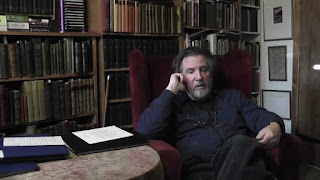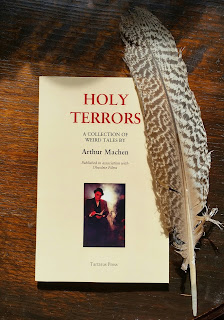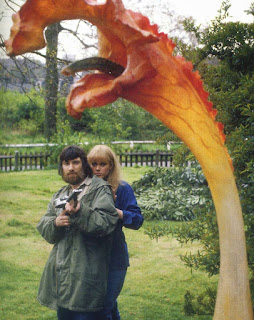Swan River Press
"Yet it was watching him, with its beautiful marred face and its cruel smile." — Oscar Wilde
Art, obsession, love, lust, sorcery—ten contemporary writers respond to the imperishable themes of Oscar Wilde’s great Decadent romance, The Picture of Dorian Gray. What happens when a face, a form, an uncanny force changes everything we thought we knew? What survives of us when we stray into a borderland of the mind, where our deepest urges seem to call up remorseless powers?
Whether in fantastic imaginary realms or in the gritty noir of today, these new stories, all especially written for this anthology, take us into some of the strangest and darkest places of the psyche. These ten boldly original portraits in the attic take many disturbing forms, revealing strong truths about the secrets of our selves, our society, and our very souls.
I don't quite know what it was about the book but from the moment the teenage me saw the bright yellow 'Complete Works of Oscar Wilde' with it's Aubrey Beardsley illustration (of 'Salome' if memory serves) I desperately wanted to read it. It was a very out of character choice as at the time my reading materials of choice were post apocalypse sci fi, beat fiction and underground comics so when I saw, what I presumed to be, a book of drawing room farces sporting that stark and stunning erotic cover art I just couldn't resist. I can't remember much about the whole but I do recall enjoying various shorts and trying, failing and skipping the plays but mostly I remember 'The Picture of Dorian Gray' and the impact it made. I became mildly besotted with it, nothing about it was like anything I'd read beyond those tedious group reads they make you do in school but living the lifestyle I did and with no knowledge of what to follow it with it lapsed into memory and it was many years before I pursued more literature of it's kind.
In his introduction Mark Valentine relates his own entanglement with the book and of his fascination with it's themes of identity, behaviours and destiny before handing us over to the ten authors chosen to reflect and reinterpret these themes.
 |
| Reggie Oliver (photo by R.B. Russell) |
Caitriona Lally's 'This is How it Will Be' is certainly no less powerful but it's story of identity loss (or perhaps identity theft would be a more appropriate term) comes with the extra frisson of frustrating believability as it reduces you to uncomfortably berating the narrator for her passivity, her malleability and her gullibility in the knowledge that in doing so you are, perhaps, behaving no differently from her new friend.
Lynda E. Rucker's 'Every Exquisite Thing' is a tricksier affair that chases love or at least the ghost of it to various locations only to find it unknowing and disheartening . It seemed to me to speak of hidden lives and the reinventions of self and of a futile desire for stability amidst change.
 |
| John Howard |
D.P. Watt's tale of psychic vampirism, 'Doreen', is a jarring contrast to the subtlety of the previous and feels in many ways to be a hark back to the macabre tales of old but with a touch of the Beryl Cook in it's cast and milieu.
Rosanne Rabinowitz brings us right up to date with a harrowing and odd tale of two women caught up in the upsurge of racist idiocy that followed the E.U. vote in 'All That's Solid' while Avalon Brantley offers a tale redolent of Victorian houses filled with artistic gentlemen of impeccable manners and indulgent habits. Of discussions over brandy and cigars and of falls from grace as inevitable as they are improbable.
Timothy J. Jarvis' story within a story - that great tradition of the ghostly tale - 'The Yellow Book' layers the weird and the mundane to create an oddly soap operatic folk horror whereas in 'A Labyrinth of Graves' John Gale offers a tale of love, jealousy, rage, regret and longevity as we are offered fleeting glimpses of the long existence of a god and the mutual impact of the life and death of one particular devotee.
The book ends with 'The Anatomy Lesson of Professor Stebbing' by Derek John a light footed and fun steampunkish yarn concerning the titular 'scientist' and his machine to modify and manipulate the soul.
When I begun this book I was definitely expecting a parade of stories more directly linked to the original but what I got was something far more diverse and significantly more interesting. There are moments when the link seems particularly tenuous but once you accept this the quality of the individual pieces shines through and what you get is a set of thought provoking and hugely enjoyable stories by a group of very interesting new (to me at least) writers assembled by one of the pre-eminent writers of (and about) the weird working today.
Available direct from the publisher.
..........................................................................................
If you enjoy what we do here on Wyrd Britain and would like to help us continue then we would very much welcome a donation towards keeping the blog going - paypal.me/wyrdbritain









